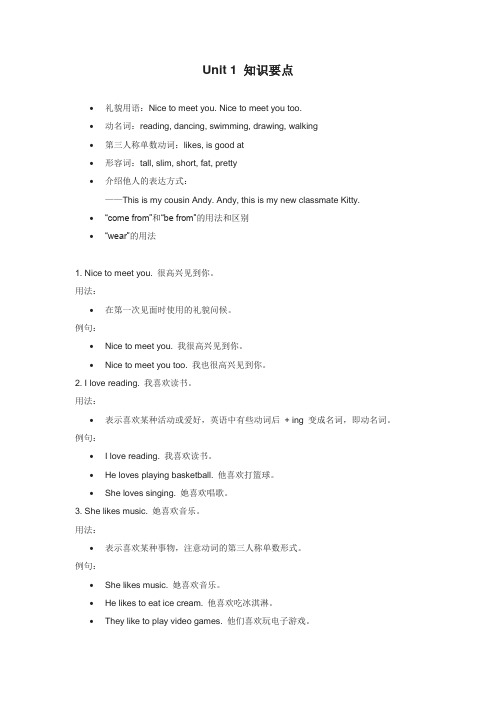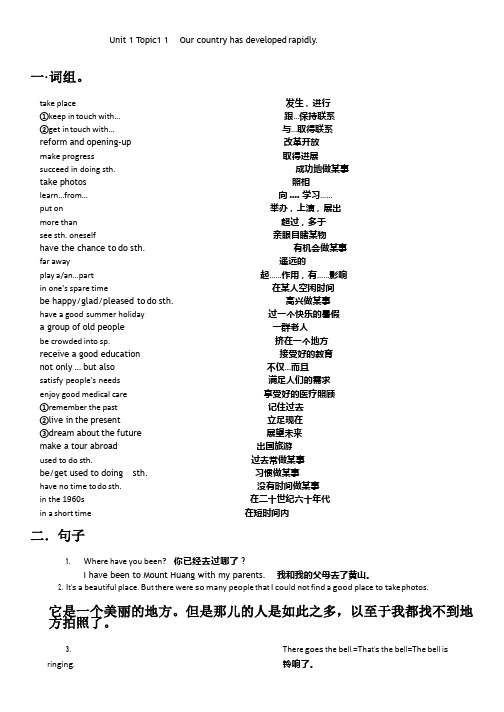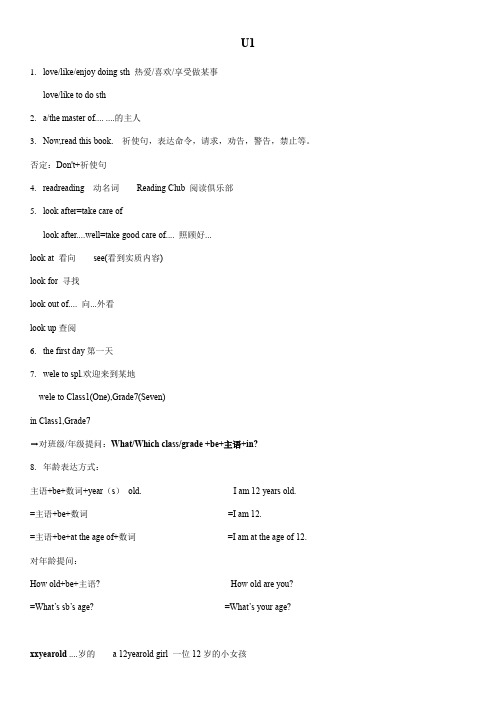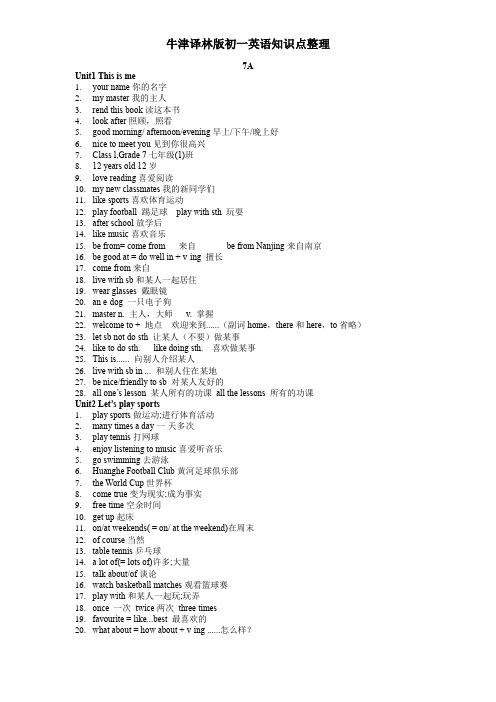牛津译林版七年级英语上册第一单元知识点汇总
牛津译林版七年级英语上册Unit1归纳知识点汇总

牛津译林版七年级英语上册Unit1归纳知识点汇总一、单词短语1.love比like程度更深love doing/to do sth. loving doing多表示一贯的爱好,而love to do则多表示具体喜欢做的一件事。
enjoy doing sth (enjoy 译为喜欢,只能加doing)2.What's your name ? 回答:My name is .../ I’m....询问名字的方法还有:May I have your name ?/ Can you tell me your name ?3.master主人one’s master = the master of sb 某物或某人的主人Master(硕士)4.5.How to look after your e-dog.如何照顾你的电子狗。
疑问词+ 不定式(to do)如:I don’t know what to eat.look after=take care of照顾;照料I can look after myself.我能照顾我自己。
look after sb well = take good care of sb 照顾好某人look for 寻找look at 看。
look like 看起来像look out 小心(=Be careful! / Take care)look out of 朝...往外看look the same 看起来一样6.The new students in Class 1, Grade 7 at Sunshine Middle School are greeting each other.Class One Grade Seven 由小到大,都要大写用法相同的还有number ,lesson,unit,group,roomI’m in Grade 7.(对划线部分提问)What/ Which grade are you in?Our school has six grades.我们学校有6个年级。
七年级英语上册unit1词组及短语归纳牛津译林版

七年级英语上册unit1词组及短语归纳
(牛津译林版)
七年级英语上册unit1词组及短语归纳(牛津译林版)
1 读/看这本书 read this book
2 照顾 look a怎样照顾你的电子狗 how to look after your e-dog
3 (与)某人交朋友 mads (with sb.)
4 第一天△day
5 向某人作自我介绍△introdulf to sb在七年级一班in Class 1, GradlaGrade Sev热爱读书 love reading love/like/enjoy doing喜爱做某事
喜爱踢足球 love playing football
8 喜欢听音乐 like listeningu喜爱玩电脑游戏laying computer ga0 来自………= be from…努力学习(工作) work hard
12 擅长于…;在…主面做得好be good at… = do well in…在阅读兴趣小组/参加英语兴趣小组Reading Club/glish Club戴眼镜 wear gla开始认识这些学生 gw the stud早上好。
/下午好。
Good morning./ Good a
晚上好。
(晚上见面) Good evening.
晚安。
(睡前告别) Good nig做笔记 ma出生 be b
踢足球/打羽毛球 play football/bad20 在足球场ball field。
Unit+1+知识要点梳理总结 牛津译林版七年级英语上册

Unit 1 知识要点•礼貌用语:Nice to meet you. Nice to meet you too.•动名词:reading, dancing, swimming, drawing, walking•第三人称单数动词:likes, is good at•形容词:tall, slim, short, fat, pretty•介绍他人的表达方式:——This is my cousin Andy. Andy, this is my new classmate Kitty.•“come from”和“be from”的用法和区别•“wear”的用法1. Nice to meet you. 很高兴见到你。
用法:•在第一次见面时使用的礼貌问候。
例句:•Nice to meet you. 我很高兴见到你。
•Nice to meet you too. 我也很高兴见到你。
2. I love reading. 我喜欢读书。
用法:•表示喜欢某种活动或爱好,英语中有些动词后+ ing 变成名词,即动名词。
例句:•I love reading. 我喜欢读书。
•He loves playing basketball. 他喜欢打篮球。
•She loves singing. 她喜欢唱歌。
3. She likes music. 她喜欢音乐。
用法:•表示喜欢某种事物,注意动词的第三人称单数形式。
例句:•She likes music. 她喜欢音乐。
•He likes to eat ice cream. 他喜欢吃冰淇淋。
•They like to play video games. 他们喜欢玩电子游戏。
4. He is good at Maths. 他数学很好。
用法:•表示擅长某方面。
例句:•He is good at Maths. 他数学很好。
•She is good at dancing. 她跳舞很厉害。
•They are good at playing football. 他们踢足球很厉害。
Unit1知识点梳理2023-2024学年牛津译林版英语七年级上册

第一讲 7A Unit1 Language Point 梳理一.Unit 1 重点语法1.would like / love sth.想要某物例句:Would you like some water?肯定回答:Yes, please. Yes, I’d like / love to.否定回答:No, thanks.2.would like / love to do sth.想要做某事例句:Would you like to drink some water?肯定回答: Yes, I’d like / love to.否定回答:I’d like / love to, but …… .3.糖葫芦形容词结构:数词+ 名词(单数) + (形容词)例:80foothigh 80 英尺高fiveinchtall 5英寸高的7yearold 7岁的注意:①名词必须用单数②只能放在名词前作定语,不能放在be 动词后作表语。
4.read/look/see/watch几个“看”的用法和区别:look 强调看的动作①系动词。
译作看起来,后接形容词。
She looks happy.②不及物动词。
译作看,词组:look at…,用副词修饰。
Tom looked at me angrily.see 及物动词,译作看到,无进行时态,强调看的结果。
watch 及物动词,译作观看,注视。
强调观看正在进行中的,发生变化的活动过程,常用于看电视、看球赛、看演出等。
read 及物动词,译作阅读。
强调看文字内容的东西,常用于看书、看报纸、看杂志等。
5.疑问代词what、which、who 及疑问副词how、when 、where可以和动词不定式连用。
what to do 做什么which to do 做哪个who to do 如何做how to do 谁做when to do 什么时候做where to do 在哪里做6.“疑问词+ to do” 结构经常放在know,learn,see ,ask等动词后做宾语。
初中英语牛津译林版七年级英语上册知识点第一单元

Unit 1 T opic1 1 Our country has developed rapidly.一·词组。
take place 发生,进行①keep in touch with…跟…保持联系②get in touch with…与…取得联系reform and opening-up 改革开放make progress 取得进展succeed in doing sth. 成功地做某事take photos 照相learn…from…向 .... 学习……put on 举办,上演,展出more than 超过,多于see sth. oneself 亲眼目睹某物have the chance to do sth. 有机会做某事far away 遥远的play a/an…part起……作用,有……影响in one's spare time 在某人空闲时间be happy/glad/pleased to do sth. 高兴做某事have a good summer holiday 过一个快乐的暑假a group of old people 一群老人be crowded into sp. 挤在一个地方receive a good education 接受好的教育not only … but also 不仅…而且satisfy people's needs 满足人们的需求enjoy good medical care 享受好的医疗照顾①remember the past 记住过去②live in the present 立足现在③dream about the future 展望未来make a tour abroad 出国旅游used to do sth. 过去常做某事be/get used to doing sth. 习惯做某事have no time to d o sth. 没有时间做某事in the 1960s 在二十世纪六十年代in a short time 在短时间内二.句子1.Where have you been? 你已经去过哪了?I have been to Mount Huang with my parents. 我和我的父母去了黄山。
Unit1重要知识点牛津译林版英语七年级上册

U11.love/like/enjoy doing sth 热爱/喜欢/享受做某事love/like to do sth2.a/the master of.... ....的主人3.Now,read this book. 祈使句,表达命令,请求,劝告,警告,禁止等。
否定:Don't+祈使句4.readreading 动名词Reading Club 阅读俱乐部5.look after=take care oflook after....well=take good care of.... 照顾好...look at 看向see(看到实质内容)look for 寻找look out of.... 向...外看look up查阅6.the first day第一天7.wele to spl.欢迎来到某地wele to Class1(One),Grade7(Seven)in Class1,Grade7➡对班级/年级提问:What/Which class/grade +be+主语+in?8.年龄表达方式:主语+be+数词+year(s)old. I am 12 years old.=主语+be+数词=I am 12.=主语+be+at the age of+数词=I am at the age of 12.对年龄提问:How old+be+主语? How old are you?=What’s sb’s age? =What’s your age? xxyearold ....岁的 a 12yearold girl 一位12岁的小女孩9.play+球类运动play footballplay the+乐器名词play the piano10.after class/school/lunch....11.be from=e from 来自Where +be+主语+from?=Where+助动词+主语+e from?12.be good at (doing ) sth=do well in (doing) sth 擅长做某事(=do sth well)13.★Be动词的一般现在时14.at the age of... 在...岁时15.go walking➡go+ving=go for a walkgo swimming=go for a swim16.glad/nice to meet you. ➡It's glad/nice to meet you.It’s+adj.+to do sth做某事....17.I see.我明白了。
牛津译林版七年级上英语知识点总结

7AUnit1 This is me1.your name你的名字2.my master我的主人3.rend this book读这本书4.look after照顾,照看5.good morning/ afternoon/evening早上/下午/晚上好6.nice to meet you见到你很高兴7.Class l,Grade 7七年级(1)班8.12 years old 12岁9.love reading喜爱阅读10.my new classmates我的新同学们11.like sports喜欢体育运动12.play football 踢足球play with sth 玩耍13.after school放学后14.like music喜欢音乐15.be from= come from 来自be from Nanjing来自南京16.be good at = do well in + v-ing 擅长e from来自18.live with sb和某人一起居住19.wear glasses 戴眼镜20.an e-dog 一只电子狗21.master n. 主人,大师v. 掌握22.welcome to + 地点欢迎来到......(副词home,there和here,to省略)23.let sb not do sth 让某人(不要)做某事24.like to do sth. like doing sth. 喜欢做某事25.This is...... 向别人介绍某人26.live with sb in ... 和别人住在某地27.be nice/friendly to sb 对某人友好的28.all one’s lesson 某人所有的功课all the lessons 所有的功课Unit2 Let’s play sports1.play sports做运动;进行体育活动2.many times a day一-天多次3.play tennis打网球4.enjoy listening to music喜爱听音乐5.go swimming去游泳6.Huanghe Football Club黄河足球俱乐部7.the World Cup世界杯e true变为现实;成为事实9.free time空余时间10.get up起床11.on/at weekends( = on/ at the weekend)在周末12.of course当然13.table tennis乒乓球14. a lot of(= lots of)许多;大量15.talk about/of谈论16.watch basketball matches观看篮球赛17.play with和某人一起玩;玩弄18.once 一次twice两次three times19.favourite = like...best 最喜欢的20.what about = how about + v-ing ......怎么样?21.be a member of = be in 成为......其中的一员22.look +adj look at + adv23.in one’s free/spare time 在某人的空闲时间24.enjoy doing sth 喜欢做某事25.make sb. do sth.使/让某人做某事make sb./sth. + adj.使某人/某物处于.....状态26.want to do sth = would like to do sth 想要做某事27.hope to do sth 希望做某事hope sb will/can do sth 希望某人做某事没有hope sb to do sth28.talk with sb about sth 和某人谈论某事29.fun 不可数名词funny 有趣的have fun +v-ing 做某事玩得愉快30.feel + adj31.reading is fun. 动名词作主语,谓语动词用单数形式。
牛津译林版七年级上册英语Unit1知识点总结

牛津译林版七年级上册英语Unit1知识点总结Unit 1 This is me!1.How to look after your e-dogIf you want to take care of your electronic dog。
you need to know how to do it。
"How to" is a n word followed by an infinitive verb。
"Look after" means to take care of something or XXX.2.Good evening.Good evening" XXX。
It is different from "good night," which is used when XXX.3.XXXIf you enjoy playing football after school。
you can say that you love it。
"Love/like doing something" XXX。
while "love/like to do something" emphasizes a one-time n.For example。
"She loves watching TV。
but today she loves to listen to music." "Love" can be used as a verb to mean "like" or "enjoy," as in "He loves his parents" or "She loves music." It can also be used as a noun to mean "n" or "beloved," as in "a mother's love for her children" or "fall in love with XXX."nally。
- 1、下载文档前请自行甄别文档内容的完整性,平台不提供额外的编辑、内容补充、找答案等附加服务。
- 2、"仅部分预览"的文档,不可在线预览部分如存在完整性等问题,可反馈申请退款(可完整预览的文档不适用该条件!)。
- 3、如文档侵犯您的权益,请联系客服反馈,我们会尽快为您处理(人工客服工作时间:9:00-18:30)。
牛津译林版七年级英语上册第一单元知识点汇总Unit 1 This is me!1. They are introducing themselves to each other. 同学们正在相互做自我介绍。
①introduce oneself :介绍某人自己。
把某人介绍给某人用“introduce… to…让我介绍一个新同学给你们。
Let me ___________ a new classmate ________ you.你愿意给我们做个自我介绍吗?Would you like_____________________________ us?②each other 相互,互相我们应该互相帮助,互相学习。
We should ________________ and___________________.还能构成短语one…the other, 即“一个……另一个”.我有两叔叔,一个在中国,另一个在美国。
I have two uncles. One is in China, the other one is in America.2. Welcome to Beijing Sunshine Secondary School!①“欢迎去某地”可以用welcome to…来表达。
如: Welcome to our country, Jack.当在地点副词前要省略介词to,如:Welcome back home.欢迎回家。
②另外You’re welcome.可以表达“不用谢”,“欢迎下次光顾”,“欢迎你”的意思。
―I’ll come to your hometown. ―You’re welcome. 此时表示“欢迎你”。
―Thank you for your help. ―You’re welcome. 此时表示“不用谢”。
The President welcomed his friend to his home.You are always welcome at my house.3. He’s very clever at Maths. 他擅长数学。
be clever at (doing)sth.擅长(做)某事, 同义短语还有be good at ,do well in.因此这句话还可说为________________________.或_______________________.再如:The boy is clever at playing football.= The boy_________________________.= The boy _____________________________.那男孩足球踢得好。
4. He’s in the school basketball team. I’m in the Reading Club.“be in + 团队组织”可理解为be a me mber of….即:He’s in th e school basketball team.=_____________________________.I’m in the Reading Club. =_____________________________________.5. You can call me Simon.你可以叫我西蒙。
①call在此句中意思为“称呼,叫”,常用call sb./sth. sb./sth.称某人为某人,称某物为某物。
Don’t call him “a thin monkey.” 不要叫他“瘦猴”。
②call还有“电话”、“打电话”之意。
Don’t forget to call me.(call 动词,打电话)Can you give me a call? (call 名词,电话)6. I’m quite tall and slim. 我很高,很苗条。
quite: 作为表示程度的副词, “相当,十分,非常”, 相当于very。
还可构成短语quite a…,后面可修饰人或物。
如:这支篮球队相当好。
This basketball team is _____________.他是一个非常乐于助人的男孩。
He is quite_______________________.7.I wear football shoes when I play football. 当我踢足球的时候,我穿足球鞋。
when: 做疑问副词,何时;做连词,当……的时候。
这里的意思是后者。
如:I don’t know when he will arrive.(疑问副词)I go to school by bus when it rains. 当下雨的时候,我坐公共汽车上学。
(连词)She was dancing with Mr Smith at a dancing hall when her husband entered it with a pretty girl.8.I take my dog for a walk every day. 我每天带我的小狗去散步。
go for a walk 去散步, have/ take a walk散步, take sb. for a walk=walk sb. 带某人去散步如:你想和我们一起去散步吗?Would you like to______________________?9. I talk to my classmates at lunchtime. 在午餐时间,我和同学交谈。
①talk: 说,讲;谈论,交谈。
常用的短语有:talk to sb.= talk with sb.和……交谈,talk about sth.= talk on sth. 谈论关于…talk to/with sb. about sth.跟某人谈某事。
如:我喜欢和新朋友谈我自己。
I like____________________________________.②talk作名词时,可以用于have a talk with sb.I want to _______________________. 我想和她谈谈。
10. Does Amy walk home after school? 埃米放学后步行回家吗?①after school放学后,before school放学前。
类似的有after class下课后, after supper晚饭后。
②walk home步行回家,可用go back home on foot 来表示。
同时在这儿home当作副词用,所以不加to, 类似的还有walk here/there, walk upstairs/downstairs上/下楼。
若表示步行去某地,就要用walk to …Daniel often walks there with his friends.= Daniel often goes there on foot with his friends.She walks him every day.walk 后加某种动物,意思是:使……走,使……步行让我们遛马去。
Let’s walk the horse.妈妈经常在早上遛狗。
My mother often ____________ in the morning.11. Does she take a bus? 她乘公共汽车吗?动词短语:take a bus搭乘公共汽车, catch a bus 赶公共汽车, miss a bus 错过汽车介词短语:go by bus, go on a bus。
Simon doesn’t take /catch a b us to school every day.= Simon doesn’t go to school________ every day.=Simon doesn’t go to school ________________ every day.12. Here are some pictures of my family. 这儿有一些我家人的照片。
①此句为倒装句。
Here 后面动词的单复数形式要由名词来定。
这儿有你的一封信。
Here_________ a letter for you.我们的公共汽车来了!Here _________ our bus!There _______ a picture and some maps of the world on the wall.②some pictures of my family: 一些我家人的照片。
这里的of表示所属……的, 是……的东西,属于……。
如:the end of the story故事的结尾,the name of this plant植物的名称13. I usually go running for half an hour. 我经常去跑步,跑半个小时。
①go running: 去跑步,类似这样的结构还有:go swimming去游泳; go shopping去购物; go fishing去钓鱼,go boating去划船, go walking去散步, go dancing去跳舞, go camping去野营等。
②在表示一段时间的前面要加介词for。
如:她经常游泳游一个小时吗?Does she often _____________________?14. He played for the Changjiang Football Team.play for…为……而效力,为……而战; “对抗……”可表达为play against…There will be a basketball match tomorrow. The Houston Rockets will play against the Los Angeles Lakers.明天将有场篮球赛,休斯顿火箭队对抗洛山矶湖人队。
15. You left your pencil box at home today. 今天你把铅笔盒遗留(忘记)在家了。
leave这里指“把……落在家” ,不能用forget。
如:他有时会把雨伞忘在汽车上。
__________________________________________.不要把作业忘记在家。
________________________________________________16. Can I borrow your pen? 我能借你的钢笔吗?borrow借进,借来;短语borrow…from从……借来……;“把……借给……”则为lend…to…。
